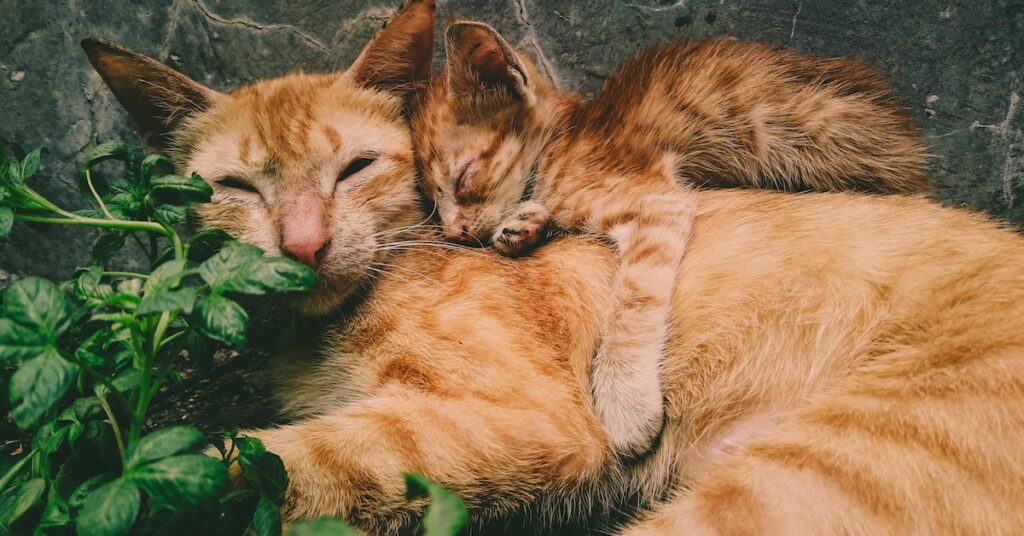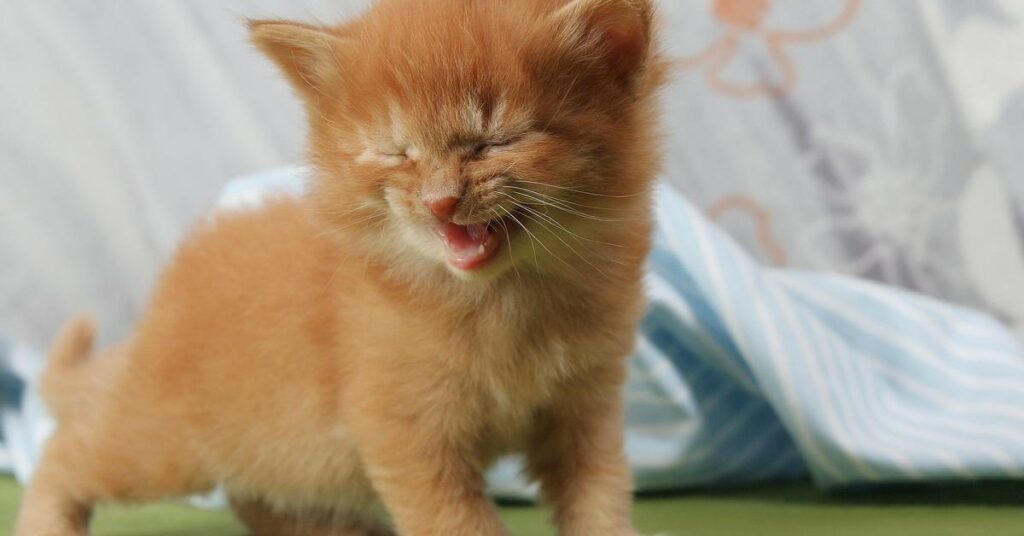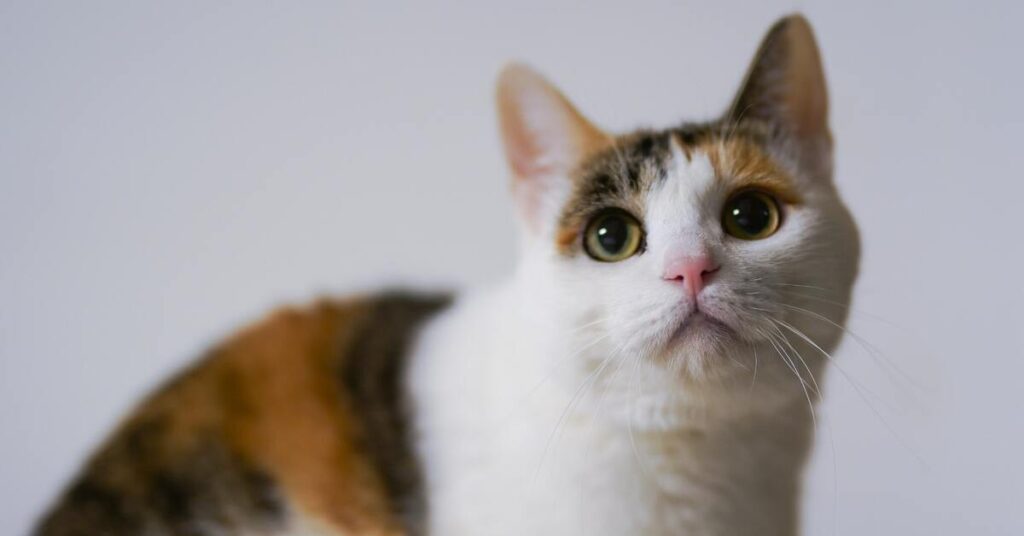Taking care of newborn kittens with their mother requires some specific procedures. These guidelines include monitoring their health and transitioning them to solid food. Other tips include keeping them warm and avoiding interaction with other pets. Keep in mind that children under eight years old should never handle them without supervision.
Monitoring kittens’ health
Monitoring the health of your kittens is essential to their healthy development. Keep an eye out for signs of illness, such as excessive crying and not sucking. Other symptoms of illness include lethargy and coldness. Sick kittens usually lie down alone, ignoring the rest of the litter. Their abdomens may also be swollen and empty. If you notice these signs, contact a veterinarian.
The first two weeks of your kittens’ lives are crucial to their health. You will want to check on them every few hours. If they are restless and crying excessively, they may be hungry. They should be nursed frequently and kept warm. Make sure you monitor their health every couple of hours to ensure they are not getting dehydration or other problems.
Newborn kittens do not have the capacity to regulate their body temperatures yet, so it’s vital to monitor their heat and body temperature. Ideally, they should spend 90 percent of their time sleeping and eating. If they are not getting adequate warmth from their mother, you can place a heating pad or heating lamp underneath the nesting box. Keep their enclosure at a temperature of 97 degrees Fahrenheit. If your kitten does not nurse, or if it is not eating properly, consult your veterinarian.
Vaccinations are another important aspect of kitten health. Feline vaccines protect them from a variety of diseases. You can begin kitten vaccinations as early as six weeks old. These shots will last for about 6 to eight weeks and include the core immunizations such as distemper, calicivirus and respiratory diseases. Your veterinarian will also determine whether or not your kitten needs additional vaccinations for specific health problems.
Transitioning to solid food
You can begin transitioning newborn kittens to solid food with their mother around three to four weeks of age. While this transition can be stressful for both mother and kitten, it is necessary for the kitten’s health. A gradual transition from milk to solids will ensure a healthy and happy future for both.
The first step in weaning a kitten from mother’s milk to solid food is to introduce the kitten to a small amount of wet food. This will help acclimate the kitten to the new flavors and proteins. Gradually increase the ratio at each feeding. It is also important to monitor the weight of the kitten during this stage to make sure the new food is not causing weight loss. If you observe a significant loss in weight, you can consider supplementing with a bottle or another method of feeding the kitten.
It is also very important to allow the mother to nurse her newborn kittens during the first couple of weeks. This is because the nutrients in the mother’s milk help the kitten transition from milk to solid food and form an immune system. These antibodies will help protect the kitten from disease and infection.
While it is important to monitor the growth of the kitten, it is important to remember that the transition from milk to solid food is a gradual one and should only begin after the kitten is four weeks of age. This will allow the kitten to grow and develop independently. Eventually, the kitten will be able to spend longer periods away from the mother and will no longer require milk from her.
The process is relatively easy if you follow the proper feeding protocol. The best kitten food is one that is high in protein and fat. The best brands have no meat by-products, and no corn or grain. Weaning a newborn kitten will require some extra time and money on your part, but it is well worth the effort for a healthy future for the kitten.
Checking if kittens are warm
If you have just found a kitten, the first thing you should do is assess its situation. Is it warm and clean? Is it not hungry? Are there signs that mom has been away from the kittens for some time? If mom has been gone for several hours, then you should bring the kittens inside and warm them up. You should also make sure they are dry and safe from predators. You can also feed them some kitten formula or KMR to keep them warm.
The kitten’s body temperature should be in the range of 101 to 102 degrees Fahrenheit. You can use a kitty-safe thermometer to test this. You can also gauge their temperature by their behavior. If they are clustered tightly or spread out widely, they might be too hot. If your kittens are too hot, adjust the heat source to meet their needs.
A kitten needs warmth more than food to thrive. The first thing to do is to make sure they are warm before feeding. Try to hold them close, if they are cold, and warm up their pads and mouth. You can also use a normal heating pad to warm them up.
If you find a kitten with a pink tongue, it is likely that she is nursing. She should be able to crawl on her belly to nurse, and she should have milk coming from her nipples. If this is not the case, you can bottle feed them. If the mother is not feeding the kittens, she may need to be reintroduced to the cat.
If you find a kitten on the street, you should take care of it. You should bottle feed it and give it the best care possible. You can also wrap it in a towel to keep it warm. If the mother isn’t there, you should move the kitten to a more protected place until mom returns.
Avoiding allowing kittens to interact with other animals
Avoiding kittens from interacting with other animals is an important step in keeping them safe. Mammals have strong protective instincts, and these instincts can make your kitten aggressive. Keep your kitten in a room with a low traffic flow and out of the reach of other animals. This will give her a chance to settle down and calm down.
Avoid bringing kittens from different litters into the same room. They are very fragile during this period, and can easily become infected by other animals. It is also important not to mix healthy and sick kittens. You can keep them in separate boxes, but avoid mixing them unless they are siblings.
While keeping your kitten away from other animals is important, it’s also important to encourage playful playtime. You can also discourage your kitten from being aggressive with other people by introducing them to as many toys as possible. Try to keep a stash of toys in different rooms.
One kitten may love to be held while the other enjoys being on the move. The kitten may be scared of children, but a calm child will adore her. If your kitten has a mother, let her pet her and let her touch her. The mother will never reject you.
Monitoring their health
Keeping an eye on your newborn kittens’ health is an important part of their development. It is important to monitor their weight and health as well as the health of their mother. Kittens usually start to play and explore their surroundings around four to five weeks old. During this time, they will be following their mother to the litter box and playing. You should also check the health of their mammary glands to ensure that they aren’t infected. If they are red, hard, or have a discharge, this is an indication of an infection.
Keeping an eye on your newborn kittens’ health is a must if you want to avoid causing any harm to the baby. You should check them twice a day. You should also check their weight to ensure that they are getting enough food. If they are still underweight, you should supplement their food.
Newborn kittens can catch illness from other pets or outdoor animals. If you notice any symptoms of illness in your kitten, you should immediately contact a veterinarian. Dr. Pippa Elliott is an experienced veterinarian who has worked in animal clinics for 30 years. She can recommend the best treatments for your kittens.
A cat’s health and development is closely tied to that of their mother. As a result, the first few weeks after birth require close monitoring. The mother cat should be kept in a warm, comfortable environment. Monitoring the mother’s health is very important during this time, and it is important to note any changes in the cat’s appearance or behavior.
Newborn kittens cannot regulate their body temperature and can easily succumb to hypothermia. They should be kept warm with a heating pad, a heating disc, or a soft fleece blanket. Try to keep their cages at a temperature of 25 degrees Celsius. You can also use a hot water bottle, but make sure that it doesn’t come into contact with your kitten.








